What are they about?
Conversations in the Liberal Arts happen Wednesday Afternoons (4:10pm-5:10pm) in Ellis Hall. Informal discussions include a variety of topics such as politics, literature, social issues, scientific questions, as well as religion and philosophy.
Spring 2025 Schedule
April 23rd
Interdisciplinarity as a Philosopher, ft. Aiyla East, Patty Logan, and Lillian Francis ('25)
Abstract
Have you taken a Philosophy class here at Hendrix and contemplating what it would be like to major in philosophy? Maybe you’ve heard that you can’t do anything with a Philosophy degree, or you are already planning on majoring in a different field. Why not do both? Hear from Philosophy major Seniors, each of whom have double majored in various fields, including Psychology, English, and Biochemistry/Molecular Biology, to learn more about incorporating a Philosophy major into your studies at Hendrix. We will be conducting an informal Q/A following a short layout of the current Major requirements and some of our favorite classes we’ve taken in the last few years, and how our double majors have prepared us for a life outside of undergrad. We hope to see you there and bring you over to the dark side!
Zoom Recording: https://youtu.be/9oOECXo9jY4
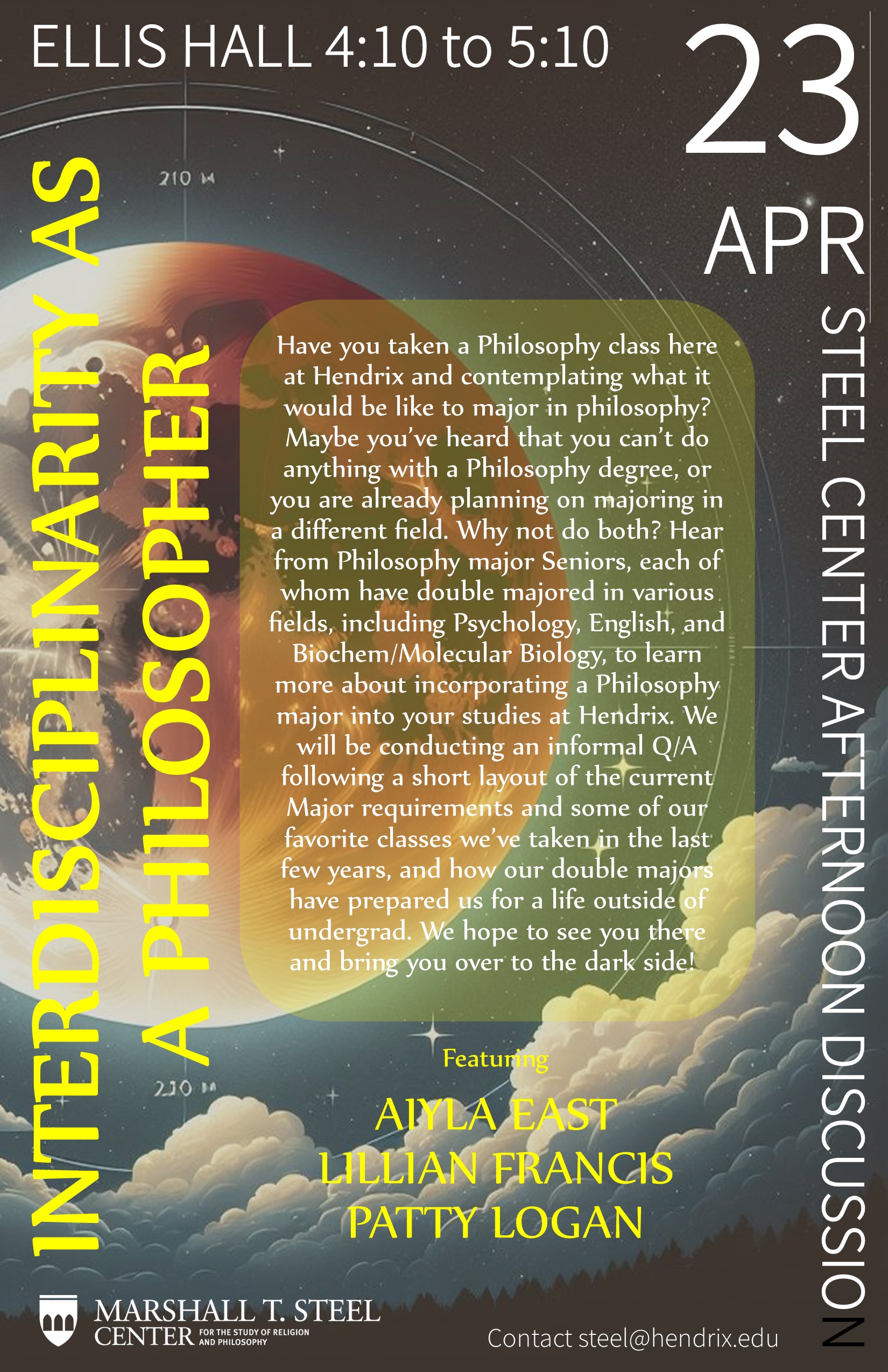
April 17th THURSDAY AFTERNOON DISCUSSION
Race and The Environment: A History of LULU's and NIMBY in Little Rock, Arkansas
Abstract
Little Rock, Arkansas, and the Little Rock Nine have a prominent and well-known place in the history of race and civil rights in the US. But racial discrimination has deep roots in the city and remains an ongoing source of inequity and discrimination against people of color. This discussion will present some of that history and how it continues to expose people of color to disproportionate environmental hazards long after the civil rights movement hoped to have achieved racial equality.
Zoom Recording: https://youtu.be/tk4TXly_63E
.jpg)
April 16th
Religion Resold: Finding Material Religion in Conway's Secondhand Stores, ft. Dr. Corey's Anthropology of Religion Class
Abstract
What do Bible comic books, dreidels, word art, a baptism certificate, tarot cards, rosaries, and tapes on raising young Christian girls have in common? They're all part of the Material Religion exhibit curated by Dr. Corey's Anthropology of Religion class! Your peers have soured the thrift stores and flea markets in search of Conway's finest repurposed religious objects that loosely cohere around the theme of "Rearing Religious Families in Central Arkansas." Come learn and discuss with us as we consider how our purchases might help us think through the ways religion is mediated in Central Arkansas in 2025 (and 1991 and 1974 and 2005). Feel free to bring an object (religious or otherwise) that is meaningful to you!
Zoom Recording: https://youtu.be/xTmz8jhsy_8
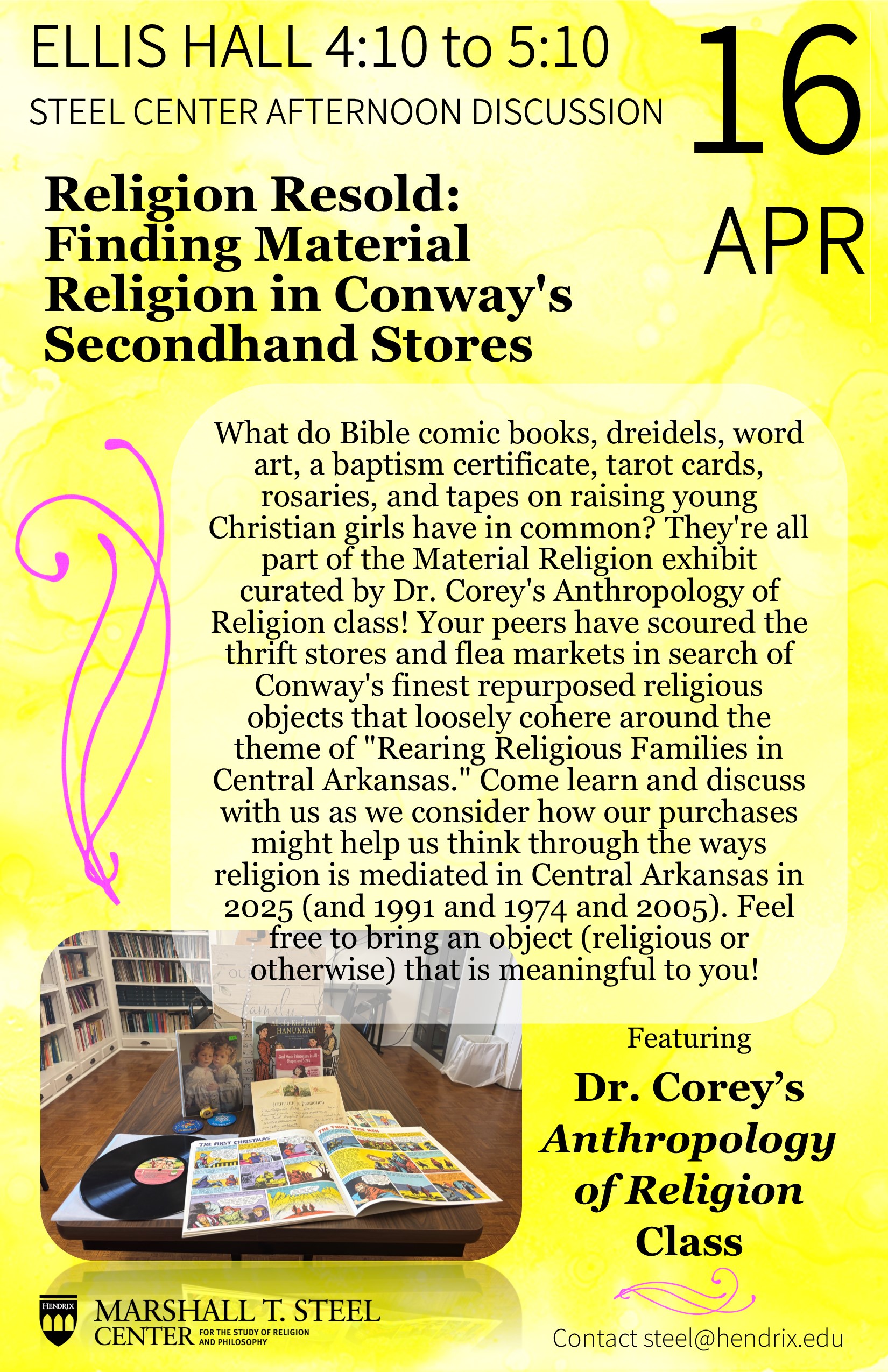
April 9th
Philosophy at the University of Arkansas, Fayetteville, ft. Barry Ward, Professor of Director of Graduate Studies
Abstract
The Philosophy Department at the U of A has ten regular tenured/tenure track professors, one teaching assistant professor, and several other research active teaching staff. We have strengths in a broad variety of areas including ethics, philosophy of psychology, epistemology, philosophy of religion, history of philosophy, and philosophy of science. We have both MA and PhD programs, an active population of graduate students, and we host talks by multiple prominent philosophers each year. In this talk, I hope to give good sense of what we have to offer to prospective grad students and anyone else with an interest in philosophy here in Northwest Arkansas.
Zoom Recording: https://youtu.be/XW0teT7X994
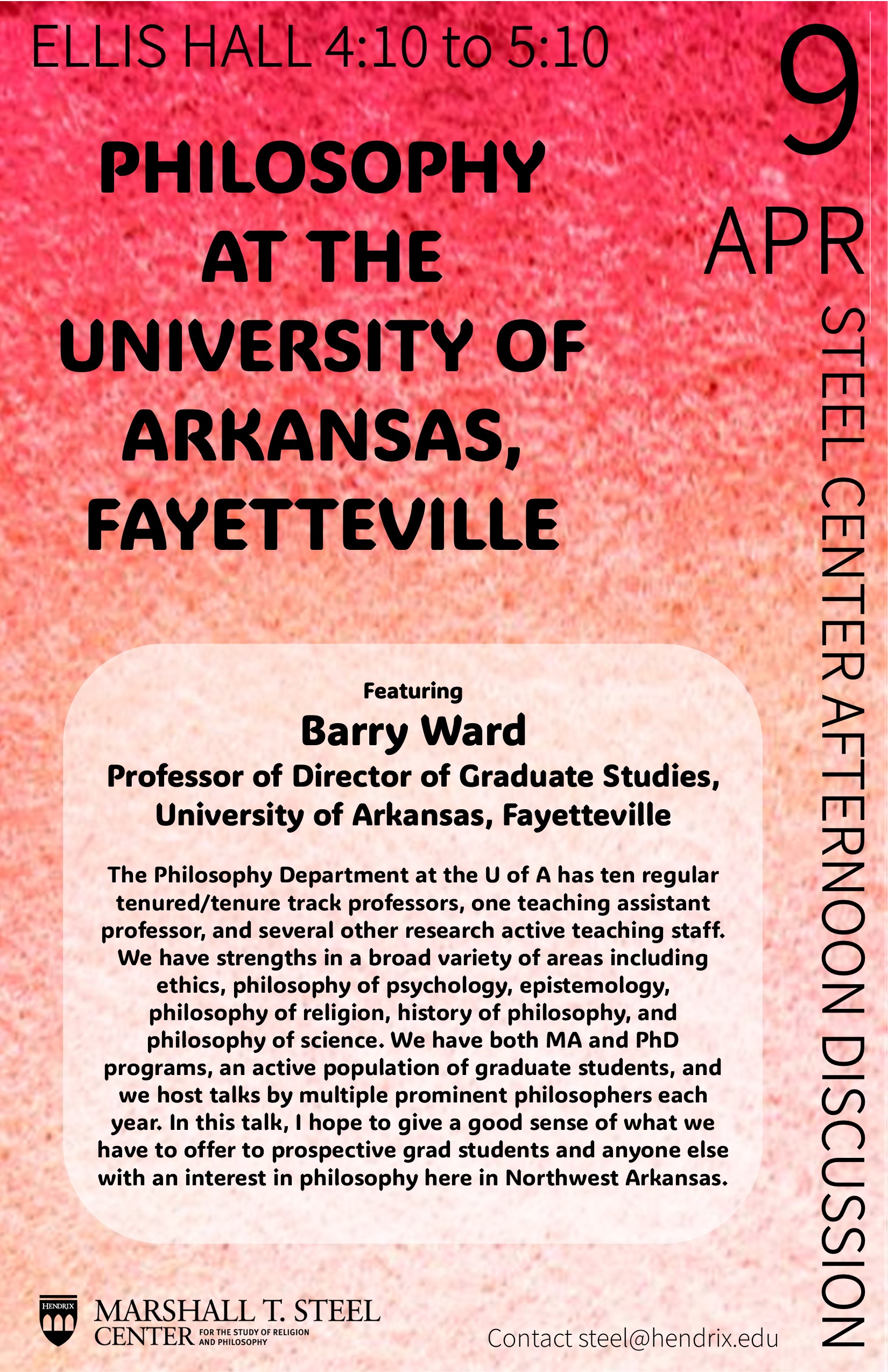
March 19th
'Mors Certa, Hora Incerta'?: Philosophical Puzzles in Defining Death ft. Dr. Lauren Bunch
Abstract
Medically and legally speaking, there are two ways to die in the United States: Death by Circulatory Criteria (DCD) and Dead by Neurological Criteria (DND). Philosophically speaking, death is a bit more complicated. In this talk, I will provide an overview of the two definitions of death and then discuss some of the metaphysical, ethical, and practical puzzles that these definitions of death introduce.
Zoom Recording: https://youtu.be/UMIsDd7kmj0
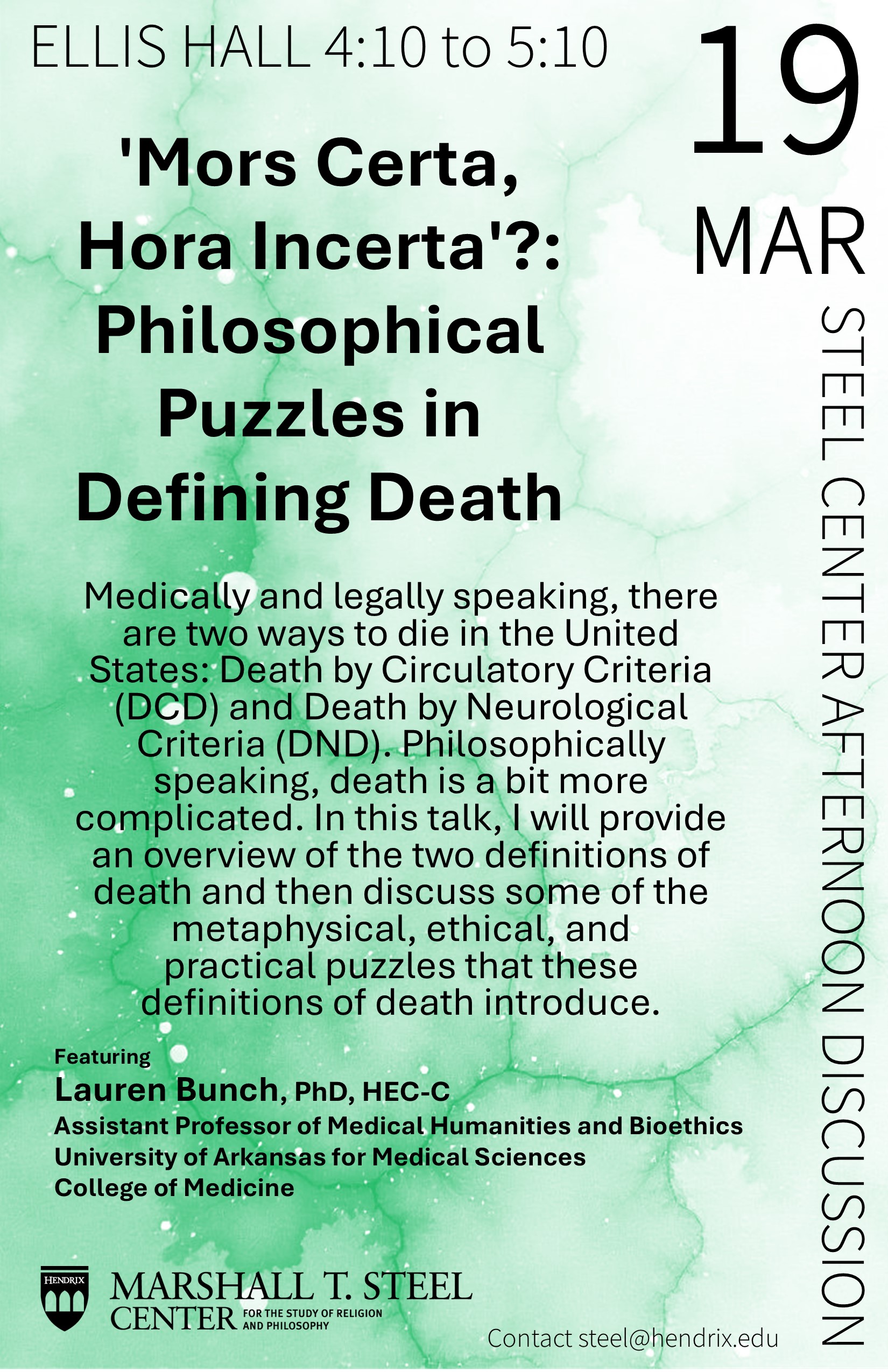
March 12th
Sequoyah National Research Center, ft. Erin Fehr
Abstract
Join us for an afternoon with Erin Fehr, Assistant Director and Archivist with the Seqouyah National Research Center at the University of Arkansas at Little Rock. Fehr will discuss details of what the Center offers, resources available to Hendrix students, staff, and faculty, how to connect with them, and more. You don't want to miss this awesome opportunity! Come visit, ask questions, and enjoy refreshments with us in Ellis Hall.
Zoom Recording: https://youtu.be/ryNQRs_GLMw
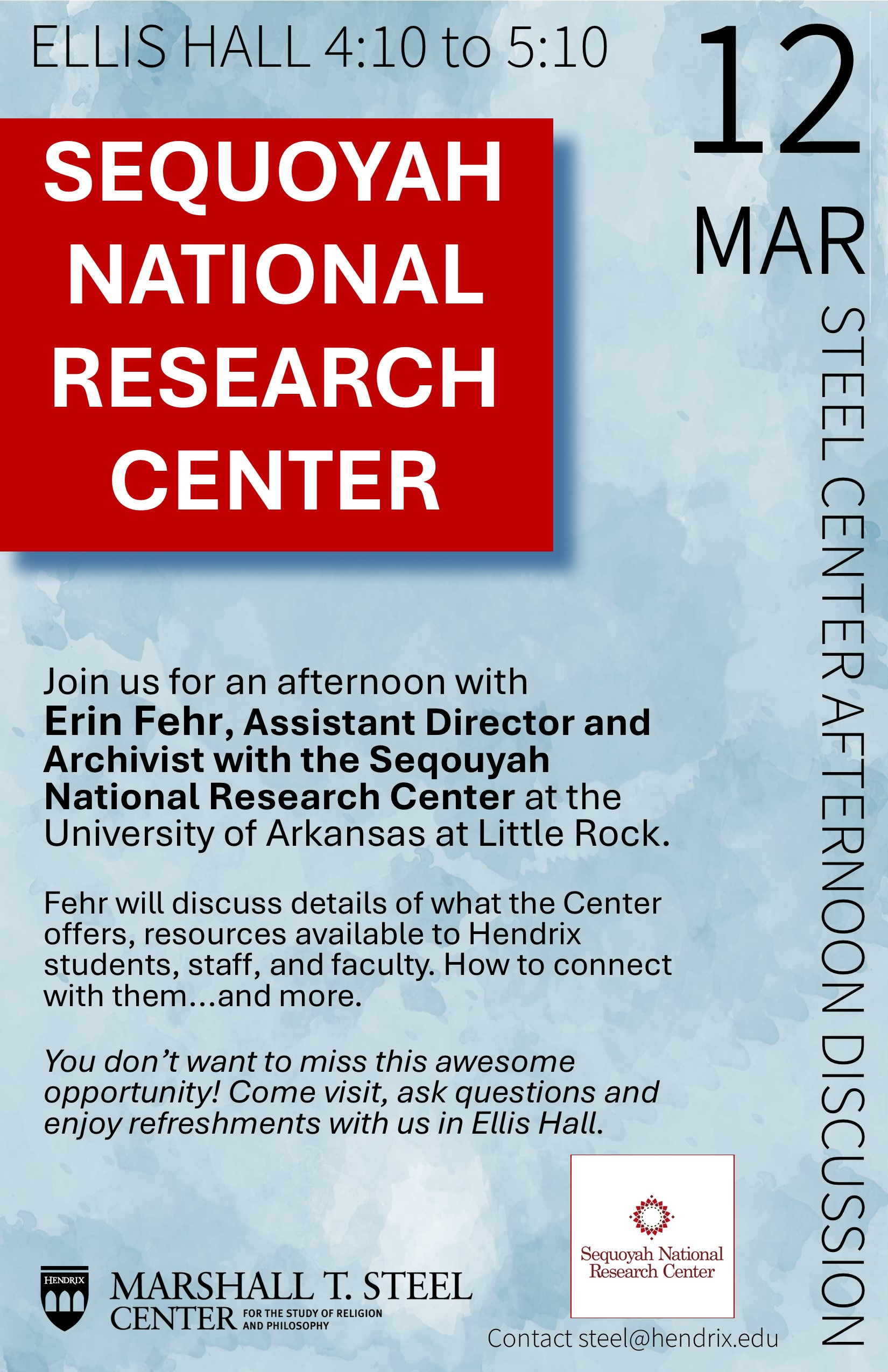
March 7th
LOCATING YOURSELF IN THE STORY: Finding Yourself in the History of American Dispossession of Indigenous Land, ft. Rebecca Clarren
Abstract
This discussion is part of a special lecture series led by Award Winning Author, and Visiting Altheimer Lecturer, Rebecca Clarren. More info can be found on the Steel Center Lectures and Special Events tab.
Zoom Recording: https://youtu.be/ga9S5snypMs
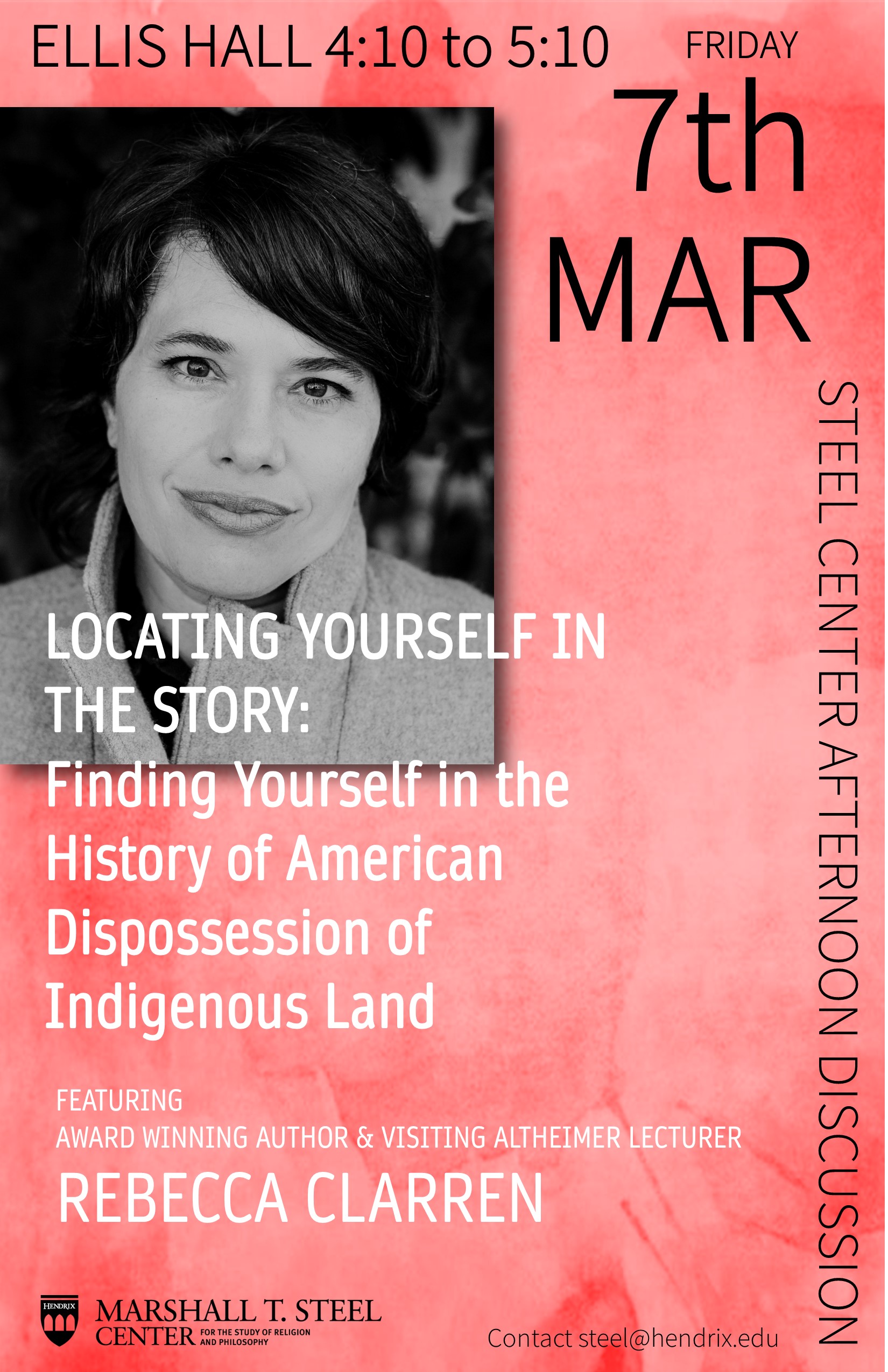
February 26th
Hunting as Going Home, ft. Nathan Kowalsky, Associate Professor of Philosophy at St. Joseph's College, University of Alberta
Abstract
"Why hunt? This question is not often asked of hunters. Rather, the more common question is why hunting is not immoral. In this presentation, then, I want to explore some of the positive reasons why I, a religious and environmental philosopher, hunt. Broadly, I hunt to go home. But I do not mean this in a literal sense (although that sense is also true). I mean it in ecological, anti-industrial, anthropological, and anti-colonial senses. Each of these have religious dimensions, but in this talk I will focus on the philosophical dimensions and how I might tie them together." - Dr. Nathan Kowalsky
Zoom recording: https://youtu.be/Z3X5jGiUprY
.jpg)
February 5th - CANCELLED, TO BE RESCHEDULED, MORE INFO TO COME SOON
Transgender Issues in Sports, ft. Terri Bonebright, Professor of Psychology
Abstract
Transgender athlete participation in sports competitions is a controversial topic that highlights the issues of fairness, injury, and discrimination in women’s sports. One recent example involves Lia Thomas, a transwoman swimmer, who won the NCAA swimming championship in 2022 and who recently lost a legal battle to participate in the Summer Olympics in Paris in 2024. Another example occurred in November of 2024, when five athletes filed a lawsuit against the Mountain West Conference due to a transwoman volleyball player on the San Jose State University women’s volleyball. These athletes claim that their Title IX rights are being violated. Additionally, congress has been wrestling with the issue when the House passed the Protection of Women and Girls in Sports Act, which would ban transgender athletes from participating in women’s sports if their sex assigned at birth is male. It would withhold funding from schools that violate this rule under Title IX. However, these issues have been evident in women’s sports much earlier through women athletes who have disorders of sexual development. Our discussion will focus on understanding the different perspectives about transgender athletes and evaluating the current proposals to address these issues in women’s sports.
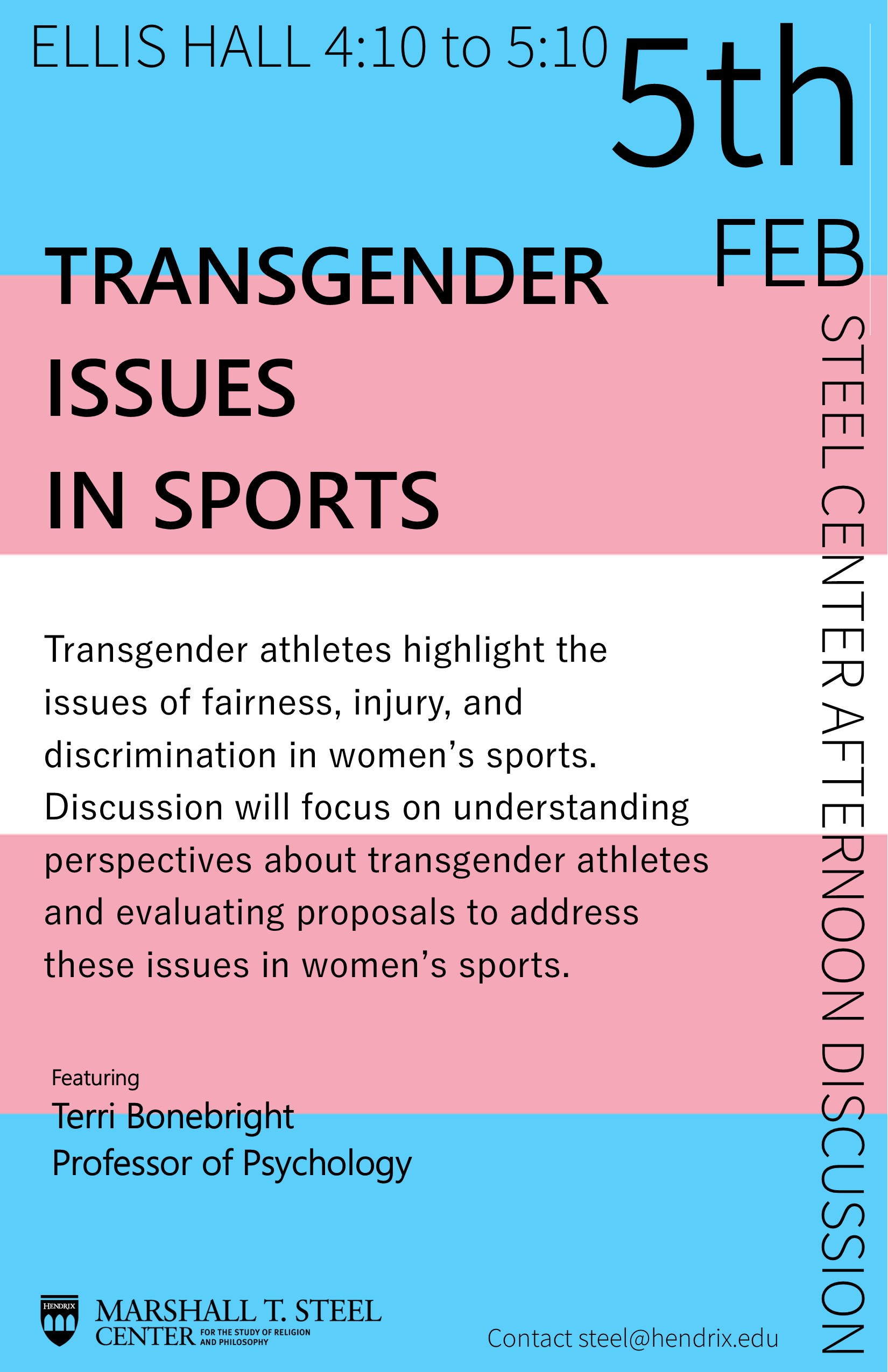
January 29th
Essential Competencies and How to Thrive @ the UALR Bowen School of Law
Abstract
Join us for an engaging panel discussion with representatives from the Bowen School of Law. All are welcome! Whether you're considering a career in law, already on the pre-law track, or just curious about the legal profession, this discussion will provide you with key information and offers an opportunity to connect with legal scholars on campus. And... you can enjoy some refreshments in Ellis Hall.
Zoom Recording: https://youtu.be/NrjxJegI6_E
.jpg)